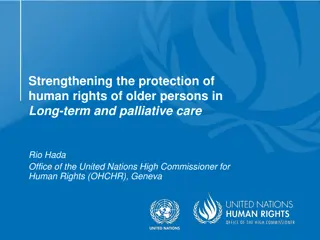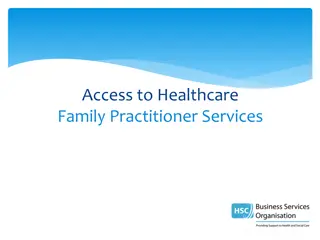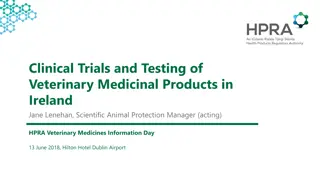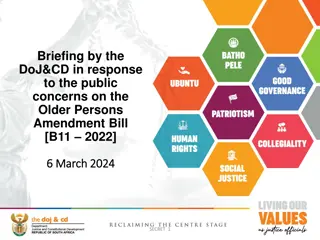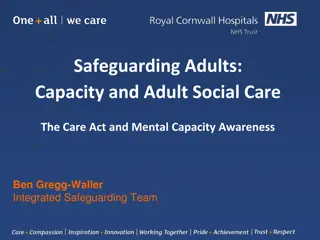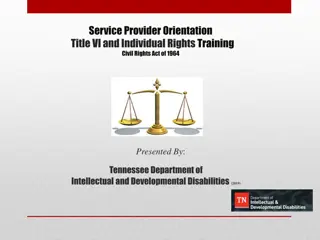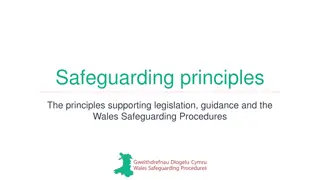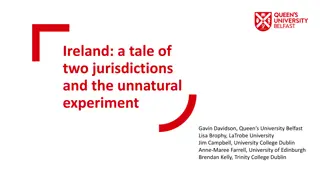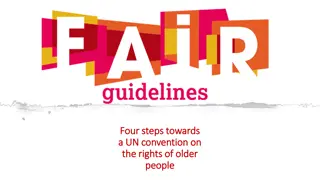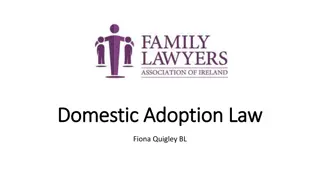Safeguarding Legislation for Protecting the Rights of Older People in Ireland
Safeguarding legislation is crucial to protect older people from abuse and neglect in Ireland. Current safeguards fall short due to a lack of uniform regulatory frameworks and limitations on investigative powers. Establishing legal frameworks and an independent authority are vital for promoting the welfare of vulnerable adults.
Download Presentation

Please find below an Image/Link to download the presentation.
The content on the website is provided AS IS for your information and personal use only. It may not be sold, licensed, or shared on other websites without obtaining consent from the author. Download presentation by click this link. If you encounter any issues during the download, it is possible that the publisher has removed the file from their server.
E N D
Presentation Transcript
World Elder Abuse Awareness Day Rights Don t Get Old Conference Why Safeguarding legislation is needed to protect the rights of Older People Patricia T Rickard-Clarke 15 June 2022
Overview Safeguarding Ireland Why we need a legal framework Some specific issues Psychological abuse/Coercive Control Deprivation of Liberty Safeguarding Legislation Conclusion
Safeguarding Ireland Main object To promote safeguarding of adults who may be vulnerable, protect them from all forms of abuse by persons, organisations and institutions and develop a national plan for promoting their welfare. Strategic Plan 2022 to 2025 - One of the main objectives of the Strategic Plan is the pursuit of the introduction and enactment of Adult Safeguarding legislation and the establishment of an independent National Adult Safeguarding Authority. Discussion Document Identifying RISKS Sharing RESPONSILILITIES: The Case for a Comprehensive Approach to Safeguarding Vulnerable Adults
Why we need a Legal Framework particularly for older people
SI Awareness Research Findings 2017-2021 Irish public believes abuse of vulnerable adults is widespread 2020 Research 12% reported having experienced abuse in the previous 6 months and one third of adults reported ever having experienced abuse. Almost one in four do not know who to report adult abuse to Public seeks dedicated 24 hour helpline for adult abuse 91% supported stronger laws to safeguard people from abuse or neglect 85% of public support establishing a national authority for safeguarding
Current Safeguarding in Ireland falls short of what is required The absences of a uniform regulatory framework (legislation, policies, accountability and enforcement) across all settings The limitations on the role of the HSE safeguarding service Absence of the Regulation of Home Care Services ** Limited form of protection afforded by regulation of Nursing Homes ** Limited obligation to disclose information about certain types of abuse Limited powers to enter premises, access information and investigate concerns Need to challenge the widely held belief that the family members of persons at risk are entitled to manage and exploit the finances and asset of their kin, in the absence of proper authorisation ** No overall regulatory body with responsibility for receiving complaints No national database for the collection of adult safeguarding issues of concern leading to critical gaps in information to inform policy and legislation No regulatory body with responsibility for, and powers to, investigate individual cases of abuse reported in residential care settings
Clear gaps in statutory provisions No Social care legislation there is no clear obligations on the State, state agencies or organisation to prevent harm or generally to protect adults at risk. There must be a statutory obligation on State bodies to do more than simply respond to crises and must have accountability to take steps which prevent adult abuse and uphold a person s rights No statutory framework for inter-agency co-operation, collaboration and data sharing No statutory obligation to report abuse, violence, exploitation or neglect perpetrated against a person at risk No statutory provision for offence of coercive control in an non-intimate relationship ** No statutory provision on protection of liberty safeguards ** No statutory provision for independent advocacy ** No statutory provision for dealing with self neglect ** No statutory provision for legal aid to create an Enduring Power of Attorney **
Psychological Abuse Coercive Control
HSE National Safeguarding Office Psychological Abuse Year 18-64 65-79 80+ 2021 46% 41% 30% 2020 42% 38% 32% 2019 33% 33% 31% 2018 30% 31% 29%
HSE National Safeguarding Office Psychological/Financial Abuse Older People 2021 18-64 65-79 80+ 10% 27% 30% Under-reporting: Caused by a number of factors but also the absence of one clear authority to report to Dearth of safeguarding and protection data generally is a critical gap.
Coercive Control Domestic Violence Act 2018 Section 39 (1) A person commits an offence where he or she knowingly and persistently engages in behaviour that (a) is controlling or coercive, (b) has a serious effect on a relevant person, and (c) a reasonable person would consider likely to have a serious effect on a relevant person. (2) For the purposes of subsection (1), a person s behaviour has a serious effect on a relevant person if the behaviour causes the relevant person (a) to fear that violence will be used against him or her, or (b) serious alarm or distress that has a substantial adverse impact on his or her usual day-to- day activities. A relevant person is defined as a spouse or civil partner of that other person, or is not the spouse or civil partner of that other person but is or was in an intimate relationship with that other person. FIX: SI recommended redefinition of a relevant person, a person is a relevant person in respect of another person if he or she is subject to the behaviour as set out in subsection (1).
Constitutional and Convention Right Constitution Article 40.4.1 No citizen shall be deprived of his personal liberty save in accordance with law European Convention on Human Rights Article 5 Everyone has the right to liberty and security of person. No one shall be deprived of his liberty save in accordance with a procedure prescribed by law exceptions (Article 5.1) Everyone who is deprived of his liberty by arrest or detention shall be entitled to take proceedings by which the lawfulness of his detention shall be decided speedily by a court (Article 5.4) UNCRPD Article 14 State Parties shall ensure that persons with disabilities on and equal basis with others (a) Enjoy the right to liberty and security of person (b) Are not deprived of their liberty unlawfully or arbitrarily, and that any deprivation of liberty, is in conformity with the law, and that the existence of a disability shall in no case justify a deprivation of liberty
AC v Cork UH and HSE [2018] IECA Application Article 40.4.1 and 40.4.2 of the Constitution Raises legal and constitutional issues of far reaching importance regarding the personal liberty not least in so far as the care and welfare of the infirm and elderly are concerned Right under the Constitution-cannot be swept away by Victorian wardship legislation Legal issue not a medical one (Art 40.4.1 provides that all detention must be in accordance with law. The reasons and motives of the detainer are not relevant to any consideration of this issue of law). Whether detention lawful? The power [to detain] claimed by the hospital amounts to a paternalistic entitlement to act in the best interests of the patients whose capacity is impaired and, in effect, to restrain their personal liberty and freedom of movement and if necessary, to do at the expense of close family members. But ever, before the Constitution the common law has always rejected the claim that personal liberty could be compromised on such a basis.
AC & others v Cork UH and HSE [2019] IESC 73 I consider that the constitutional guarantee of the right to liberty protects mentally impaired persons to the same extent as everyone else deprivation of liberty must in all cases be in accordance with law. To hold that persons cannot be found to be detained if they are not capable of making a valid decision to leave for themselves, or if they are not aware of or able to object to their situation, would not simply permit restrictions on their freedom of movement for their own protection. It would also have far-reaching consequences of denying to vulnerable persons the benefit of the constitutional guarantee that they will not be deprived of their liberty otherwise in accordance with law. It is possible for a person of full capacity to be detained without necessarily being conscious of that situation, and, equally, it is possible in the case of a person with impaired capacity. Both are entitled to legal protection. (Para 334)
Deprivation of Liberty No Protection of Liberty Safeguards legislation The State is in breach of its human rights obligations Deprivation of Liberty abusive practices imbedded in culture and practice o Greatest impact on older people Abusive practices o Will and preference of person not ascertained o Decision made, person not consulted even when person has capacity o Associated with financial abuse/coercive control o Wards of Court process inappropriate o Circuit Court has no jurisdiction o Clear direction in AC v Cork University Hospital & others [2019 IESC 73] ignored Deprivation of Liberty: Safeguard Proposals Preliminary Draft Heads of Bill and Consultation Paper (Dec 2017) No provision in the Assisted Decision-Making (Capacity) (Amendment) Bill 2022
Why we need it The need for an independent oversight body The need to broaden the issue of safeguarding vulnerable adults beyond the domain of health and social care a multi-disciplinary approach to safeguarding The need for Safeguarding and Protection Service to have stronger rights of entry and inspections The need for better intra- and inter-agency liaison and collaboration The need to ensure that people who experience abuse in any form have easy access to safeguarding and redress where relevant The need to ensure that adults in nursing homes and in other residential care facilities are fully safeguarded and their legal and human rights protected
A National Adult Safeguarding Authority An independent National Adult Safeguarding Authority with overarching responsibility of safeguarding and clear statutory duties and powers is clearly required. Functions would include: Promote standards Undertake investigations Receive reports from mandated persons Promote education, training and public awareness regarding matters concerning adults at risk Provide information to adults at risk in respect of abuse and harm they may be experiencing Supervise compliance with the duties imposed by or under legislation Provide information and guidance to service providers, organisations and bodies in the State in relation to their interaction with adults at risk, including the carrying out of risk assessments and safety statements Determine if an adult needs support an assistance Make provision, where appropriate, for independent advocacy to an adult at risk who is the subject of an investigation Provide overarching governance to a number of bodies who have a safeguarding remit .
Conclusion Safeguarding is everyone s responsibility. Adult safeguarding legislation is needed to set out principles which place human rights at the core of legislation around wellbeing, care, support and safeguarding There are large gaps in legislation, practices, systems and organisations that are very costly on individual lives and do not respect the dignity of each person as an individual with his or her own rights. There is an urgent need for the enactment of Adult Safeguarding legislation.
THANK YOU Discussion Document: Identifying RISKS Sharing RESPONSILILITIES: The Case for a Comprehensive Approach to Safeguarding Vulnerable Adults safeguardingireland.org info@safeguardingireland.org



